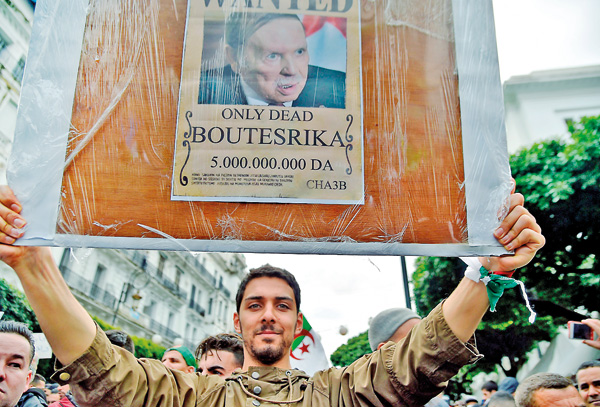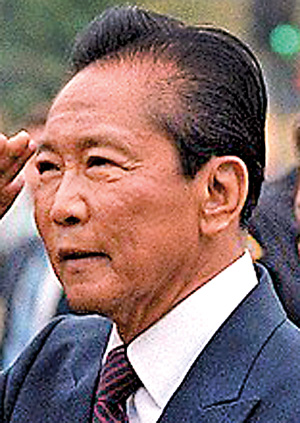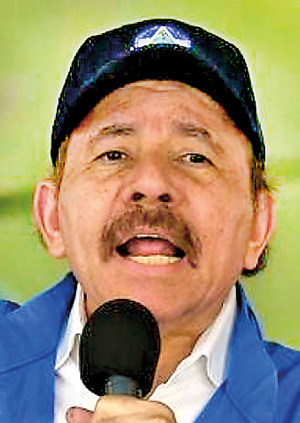Sunday Times 2
Harm that good strongmen do

An Algerian protester marches with others while carrying with a sign during a demonstration against ailing President Abdelaziz Bouteflika in the capital Algiers on Friday. AFP

Ferdinand Marcos
During periods of political instability and threatened breakdown of law and order in a country, calls are often made for the need of strongmen to take over the governance, particularly by those not well disposed towards the ruling party. This is a common global phenomenon that has happened over the years but it has often led to historic disasters rather than the envisaged utopias of the strongmen and their supporters.
The Yahapalana government was the creation of well-intentioned democratic forces that came together to throw out a near-decade-old Rajapaksa regime which was alleged to be corrupt, dictatorial and nepotistic, among other obnoxious features. However, the bringing together of the two strongest of political parties with divergent political ideologies into a ruling coalition was a volatile political mix that did not jell and instead showed signs of implosion from the very beginning.
The Rajapaksa Opposition, though down and out, was soon back on its feet and unleashed its trade union and student agitators on to the streets of Colombo and even the Colombo- Kandy road, challenging most proposals of the government. They threatened to storm government buildings, including the Presidential Secretariat. They were tear-gassed and water-cannoned, providing good entertainment at prime time for anti-UNP TV channels. This entertainment continued for three years, stalling progress and creating much political instability. It was a double edged sword that the Rajapaksa-led opposition wielded — creating political instability, while calling for law and order and maintaining ‘discipline’.

Danile Ortega
In this political maelstrom, the germ of the need for a strongman was implanted. A monk at a domestic almsgiving had stressed the need for a strongman to protect Sinhala-Buddhism. A Hitler was needed to protect Sinhala-Buddhism and he urged Gotabaya Rajapaksa to take on the role of the Sinhala Hitler. The wishful thinking of the monk made it to the front pages of national newspapers within 24 hours. We have, however, not read of any comment by Gotabaya on this call for a Sinhala-Hitler.
The monk, though he may be learned in the Dhamma, would have been unaware of disasters brought about by Hitler leaving much of his country in rubble!
In Third World countries, wracked by political dissension, war, terrorism and the like, desperate calls are often heard for the emergence of their own tin-pot Hitlers and Stalins. They forget that the mighty countries created by Hitler and Stalin collapsed after relatively brief dictatorships, bringing ruination and disaster to their people.
Third World dictators, or strongmen as they are called, fare no better today when we read newspaper headlines.
Daniel Ortega
Last week it was reported that veteran Nicaraguan Sandinista revolutionary and guerrilla fighter Daniel Ortega who, in 1978, overthrew Anastasio Somoza, the last dictator of the of the Somoza dynasty, and is President even today under threat of being thrown out by the people of his country who had been protesting against him on the streets of Managua since April last year. Ortega was leader of a revolutionary junta and president from 1979 to 1990.
Ortega was elected president thrice in 1974, 2011 and 2016; he lost thrice in 1990, 1996 and 2001. In 2014 the Ortega dominated National Assembly abolished the constitutional limits on the terms of the presidency — a move which Sri Lankans are quite familiar with. This enabled Ortega to run a third time with his wife running as Vice president to win presidency again. The Opposition called the election a farce.
The veteran Nicaraguan politician’s long but erratic progress seems to have been brought rudely to a halt, with violent public protests calling for his ouster and fresh elections. It began last April, with student protests over laws controlling forest fires in protected areas. But the protests soon escalated into a widespread campaign which saw students being attacked by pro-Ortega Sandinista students and by state paramilitary forces using tear gas and bullets. As the crisis escalated, rubber bullets and even live ammunition were fired at the protesters.
More than 325 persons have been killed and 700 taken in as political prisoners. An estimated 50,000 Nicaraguans are said to have fled the country. Last May, a Mothers Rally held in protest over the killing of students, reports said, attracted around 300,000 people.Sharpshooters attacked the demonstration, killing 15 people.
Talks between Opposition forces and the government broke down on February 27 after the crackdown on protestors.
How did this 76-year-old veteran politician, a symbolic figure in his country and who had brought in welfare measures in the fields of health, education, social security and low interest loans, stumble over student protests? The former socialist rebel has banned political demonstrations, enforced news censorship, abused human rights and deployed paramilitary forces against protesting students. Perhaps, power hunger is an affliction of strongmen who stay too long in power.
Sergio Ramirez, a writer, who was by Ortega’s side when he toppled the Somoza dictatorship and was a vice president under Ortega, now turned his critic and been quoted as saying that the thirst for power has changed him.
Bouteflika
Another legendary politician, 82-year-old Algerian President Abdelaziz Bouteflika is today defying thousands of Algerians marching against him in Algiers and other cities, demanding that he steps down from office. Bouteflika, who has been in ministerial ranks since the beginning of Algerian Independence, was elected president in 1999 and since then been re-elected in 2014 for a fourth term, which ends this year. But, in February, his office issued a statement that he would seek a fifth presidential term, and this triggered widespread protests throughout the country, prompting Bouteflika to announce that he would not be seeking another term in office. But the demonstrators want him to step down from office. Efforts by an interim prime minister appointed to form a new government are being strongly resisted.
In 2013, Bouteflika was diagnosed with a stomach cancer and the next year he suffered a stroke. He disappeared from the public eye thereafter, but, undaunted, remains in office. Meanwhile, public demonstrations continue.
Bouteflika is another example of a strongman being addicted to power and unable to give up office. Whether it is the sheer mental delight of exercising power — in most cases arbitrarily — or the fear of facing the consequences of the abuse of power has not been determined. But strongmen, who seize power or are even elected to power, show a marked reluctance to give up office. Quite often they do not die of natural causes. He, too, like most dictators who want to be president for life had the constitution amended to remove the limit of terms of the presidency for him to contest the presidency for life.
General Park
Park Chung Hee, the ruthless South Korean dictator, undoubtedly created a modern state from a war devastated wasteland but he continued to rule as an absolute dictator, suppressing all opposition for 16 continuous years until he was shot dead by his lifelong friend and chief of the KCIA (Korean Central Intelligence Agency) while they were at dinner.
Marcos
Ferdinand Marcos of the Philippines was another strongman. He was president from 1965 to 1986, ruling the country under Martial Law from 1972 to 1981. Posing as a Philippine resistance fighter against Japanese occupation, he became president and blamed the Communists for precipitating political crises. He used anti-Communist slogans to suppress opposition to his crony capitalist rule. He ruled the country under Martial Law for nine years.
Marcos appointed his wife Imelda, a former beauty queen, as Mayor of Metropolitan Manila. Like most strongmen, he was weak in controlling his wife, as she continued to appoint her relatives to top government posts although they robbed the country. The Marcos couple themselves were accused of robbing the country of millions of dollars, while brutally suppressing legal opposition.
He jailed Benigno Aquino, a highly respected politician, who, on release, went abroad, but, on his return to the country, was shot dead while descending the gangway of the plane. It was widely believed that Marcos was responsible for his killing. This caused turmoil in the country, leading to Aquino’s widow, Corazon Aquino, becoming Marcos’ major challenger at the presidency. Marcos scraped through as winner, but the results were not accepted by the people. The people power protests only ended when the Marcos couple fled the country to exile in Hawaii.
The world today has many strongmen who regard themselves Messiahs of the people who not only reject such notions but would be happy to see their end soon to end their misery. Crown Prince Mohamed Bin Salman of Saudi Arabia, Turkey’s President Recep Tayyip Erdogan and Nicholas Maduro of Venezuela are such strongmen who consider themselves Messiahs, but are suppressing the rights of the people who would be happy to be rid of them.
Do these Messiahs realise the harm that they do as strongmen, ignoring basic democratic rights?

